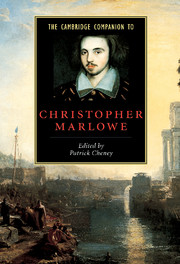Book contents
- Frontmatter
- 1 Introduction: Marlowe in the twenty-first century
- 2 Marlowe’s life
- 3 Marlovian texts and authorship
- 4 Marlowe and style
- 5 Marlowe and the politics of religion
- 6 Marlowe and the English literary scene
- 7 Marlowe’s poems and classicism
- 8 Tamburlaine the Great, Parts One and Two
- 9 The Jew of Malta
- 10 Edward II
- 11 Doctor Faustus
- 12 Dido, Queen of Carthage and The Massacre at Paris
- 13 Tragedy, patronage, and power
- 14 Geography and identity in Marlowe
- 15 Marlowe’s men and women
- 16 Marlowe in theatre and film
- 17 Marlowe’s reception and influence
- Reference Works
- Index
- Series list
- Plate section
6 - Marlowe and the English literary scene
Published online by Cambridge University Press: 28 May 2006
- Frontmatter
- 1 Introduction: Marlowe in the twenty-first century
- 2 Marlowe’s life
- 3 Marlovian texts and authorship
- 4 Marlowe and style
- 5 Marlowe and the politics of religion
- 6 Marlowe and the English literary scene
- 7 Marlowe’s poems and classicism
- 8 Tamburlaine the Great, Parts One and Two
- 9 The Jew of Malta
- 10 Edward II
- 11 Doctor Faustus
- 12 Dido, Queen of Carthage and The Massacre at Paris
- 13 Tragedy, patronage, and power
- 14 Geography and identity in Marlowe
- 15 Marlowe’s men and women
- 16 Marlowe in theatre and film
- 17 Marlowe’s reception and influence
- Reference Works
- Index
- Series list
- Plate section
Summary
Between 1587, when he left Cambridge, and his death in 1593, Marlowe's literary career developed in three social contexts: he found patronage and employment as a government spy; he associated with some of the most heterodox intellectuals of his age; and he became one of London's first professional writers. It is through these interconnected activities - reflected in Marlowe's relationships with Thomas Watson, Thomas Harriot, and William Shakespeare - that he transformed Elizabethan literature. Watson, a 'University Wit' like Marlowe, was a model of what a scholar could achieve in a career supported by patronage, publication, and playwrighting. Harriot, a brilliant scientist whose friendship resulted in accusations of their collusion in 'Sir Walter Ralegh's school of atheism', mirrored Marlowe's intellectual audacity. And Shakespeare, Marlowe's chief rival in the public theatre, engaged him in a theatrical dialogue on the meaning of history. The Marlovian moment lasted only six years, but its achievement was to prove that popular drama could be counted among those exclusive cultural activities which Thomas Nashe called 'the endeavors of art'.
Thomas Watson was among a small group of writers now called the University Wits, who gained literary reputations in the 1580s after having studied at Cambridge or Oxford. As London’s first set of university-trained professionals, the wits – whose best writers included Watson, Marlowe, Nashe, Robert Greene, George Peele, Thomas Lodge, and John Lyly – appeared at the moment when the cultural marketplace first made having a literary career viable. Watson, who killed William Bradley in 1589 while defending Marlowe, was a writer whose reputation seemed so assured that William Covell in Polymanteia (1595) called Shakespeare ‘Watson’s heir’.
- Type
- Chapter
- Information
- The Cambridge Companion to Christopher Marlowe , pp. 90 - 105Publisher: Cambridge University PressPrint publication year: 2004
- 1
- Cited by



